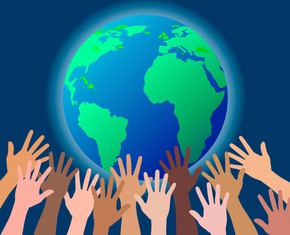The views expressed in our content reflect individual perspectives and do not represent the authoritative views of the Baha'i Faith.
Her meeting had run late, and as she pulled up in front of the house, she checked her watch. It was after ten, and the lights were out, so she figured Frank had put the kids to bed and was probably in the basement watching TV.
Frank, a Vietnam veteran, heavy drinker, and sometime drug user, kept a gun in the house and was prone to episodic flashbacks. Unlike his wife, he was not a Baha’i — Frank viewed all religions with disdain. On more than one occasion during his episodes, Elaine had to take the children to a friend’s house in the middle of the night.
Frank didn’t like it when Elaine came home late.
As she approached the front door, the bushes began to rustle, and a shadow materialized next to her with a gun in his hand. “Frank! It’s me! It’s me – Elaine!” she gasped. Fortunately, he was so drunk he wasn’t able to fire, and she calmed him and helped him back into the house, where he passed out on the couch.
RELATED: The 9 Different Types of Safety: From Physical to Emotional
After that, someone always accompanied her home from our Baha’i meetings and waited until Elaine was safely inside — although the inside of that home didn’t really seem all that safe.
My friend Elaine and I served together on the Baha’i Local Spiritual Assembly in our town. Baha’is believe in one God, whom we all worship, and that periodically he sends us divine messengers to educate us and help civilization advance. The most recent of those messengers — Baha’u’llah, the prophet and founder of the Baha’i Faith, taught that there is only one race — the human race. Since the Baha’is have no clergy, community affairs are organized by democratically-elected nine-member administrative bodies called Spiritual Assemblies.
In the mid-1990s, I went back to school to study non-profit organizational management. My kids were in high school, and I knew that in a few short years, they wouldn’t need me as much as they did now, so I wanted to prepare myself to be able to give back to the community. Through the years I had volunteered for various organizations and knew that the skills I learned in this program could help a variety of organizations not only to carry out their missions more effectively, but also to ensure their relevancy and continuation into the future.
I had completed my course work and was considering what I could do for my professional project. I wanted to do something timely and of value to others, not just something to complete the requirements of my program. Two quotations from the Baha’i writings helped direct my choice. Baha’u’llah wrote:
Be anxiously concerned with the needs of the age ye live in, and centre your deliberations on its exigencies and requirements.
Baha’u’llah also wrote:
Knowledge is as wings to man’s life, and a ladder for his ascent. Its acquisition is incumbent upon everyone. The knowledge of such sciences, however, should be acquired as can profit the peoples of the earth, and not those which begin with words and end with words.
For me, attention to the issue of domestic violence in my role as a member of the Local Spiritual Assembly was raised by several consecutive events.
First, was the incident with my friend Elaine, which weighed heavily on my heart and mind. None of us had known quite how to deal with the situation except to accompany her home from meetings and wait until she was inside. Then, in 1997, the National Spiritual Assembly of the Baha’is of the United States produced a statement on the equality of women and men entitled “Two Wings of a Bird,” which maintained the necessity of equal rights, opportunities, and privileges for both women and men.
Encouraged by this publication, the Baha’is in Santa Fe, New Mexico, held a conference on domestic violence. Our Assembly sent a representative to the conference and consulted with her when she returned. She said it had been excellent as far as it had gone, but that most of the attendees had been abuse survivors. She thought it would have been helpful to focus more on how Baha’i communities could respond. We agreed and decided it was important to take the next logical step by providing a seminar to assist Spiritual Assemblies and their members in better understanding the Baha’i teachings on family relationships, which would enable them to apply this guidance in their communities.
At that point, I realized that there was a terrific opportunity to meet my academic and moral obligations. When my offer to organize a follow-up seminar for our metropolitan area was accepted, I put together a four-member taskforce to help me. It was composed of the delegate to the Santa Fe conference, a psychotherapist and certified domestic violence counselor, a board member of an area safe house, and the executive director of a nursing home who had been hired after his predecessor had been fired for allowing senior abuse.
The one-day seminar began with presentations from experts in the field. A speaker from a counseling group for abusive men defined and discussed domestic violence. This was followed by discussions on child abuse by the program director of a family advocacy, education, and support agency, and then on senior abuse by the nursing home administrator. “Women as Abusers” concluded the morning presentations. There was time for questions after each presentation, and presenters sat with attendees at lunch for more informal discussions.
In the afternoon, participants examined the Baha’i writings for guidance on these tough issues, considering both individuals’ and institutions’ responsibilities in the healing process. An attorney explained the legal aspects. Participants then broke into small groups to consider real-life cases and practice appropriate responses as both victims and Assembly or community members. The sample cases included a battered spouse, a controlling partner, an immigrant couple with marital issues owing to cultural differences, a parent who used physical restraints to control an out-of-control child, and a spouse at the end of her rope from the stress of work and caring for her husband, children, and her mother with Alzheimer’s disease.
The seminar had a unique feature: a “safe room” with volunteers. These volunteers were carefully selected to be available to comfort participants who might have intense emotional reactions to some of the subjects discussed.
RELATED: Real Men Don’t Hit Women, My Father Said
One of the tools I compiled for the seminar was a handbook, which provided presentation outlines, workshop materials, Baha’i references and articles, and contact information for local resources. The handbook included a “self-test” to help participants examine their own lives to gain more clarity on what types of behavior could be considered abusive. For example:
Does your partner continually monitor your time and make you account for every minute (when you run errands, visit friends, commute to work, etc.?) Yes /No
Do you monitor your partner? Yes/No
It also included a safety escape plan for individuals who need to leave their home, and a suggested crisis response instruction sheet for members of Local Spiritual Assemblies should they receive a crisis phone call. This sheet included suggestions on what to do, how to do it, and who to call, depending on the situation’s immediacy.
Shortly after my project was completed, some of the materials I helped develop were shared with the U.S. Baha’i National Spiritual Assembly through its National Committee for the Equality of Women and Men. Shortly thereafter, an Assembly Development Module Workshop on Domestic Violence was made available to all U.S. Baha’i communities. Later a detailed 95-page document, “Guidelines for Spiritual Assemblies on Domestic Violence,” was produced by the National Spiritual Assembly. I hope that my work contributed to the development of these helpful resources.
It has been more than 20 years since I completed my project. Immediately after my graduation, my husband and I went overseas to volunteer our services at the Baha’i World Centre in Haifa, Israel. In 2004, we returned to the States and I worked for a local nonprofit agency while assisting my elderly mother, who was struggling with Alzheimer’s disease.
Now that I’m retired, I’ve had some time to reflect on the issue of domestic violence, which still disrupts so many lives. Through the years, unfortunately, I have lost touch with Elaine. I sincerely hope that Frank has received the help he needed for his post-traumatic stress disorder, and that Elaine is living a life free from fear.
















Comments
Sign in or create an account
Continue with Googleor